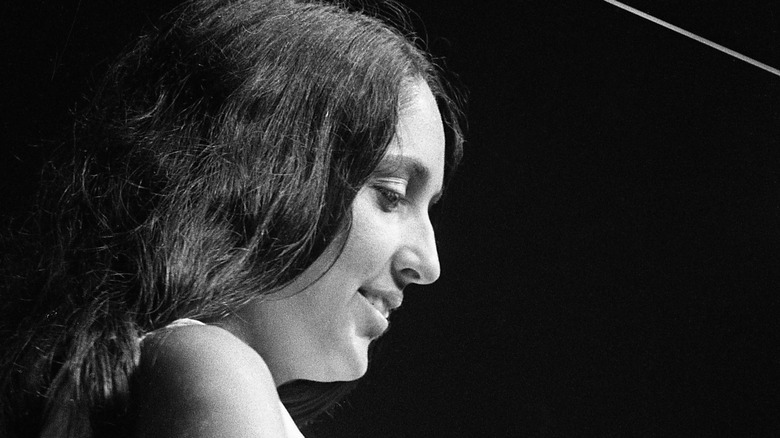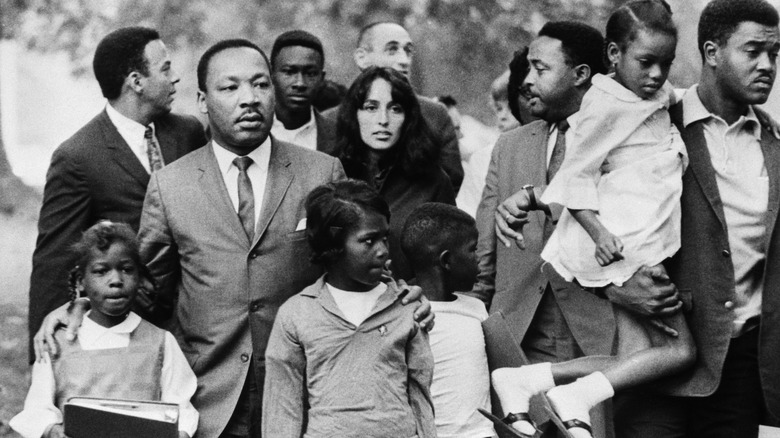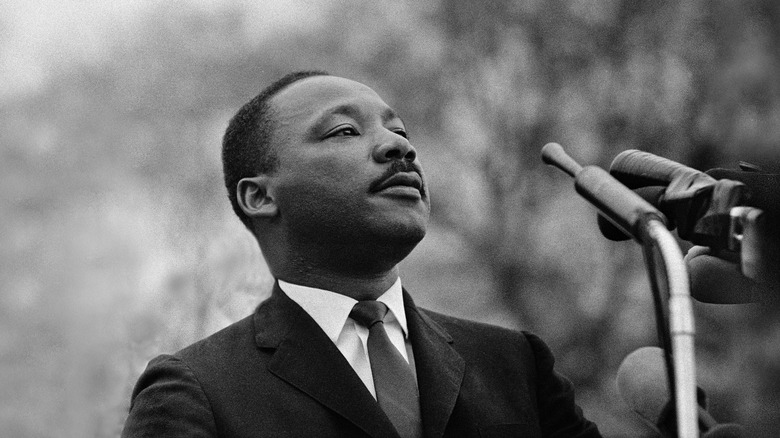Martin Luther King Jr.'s Relationship With Folk Icon Joan Baez Explained
Folk singer Joan Baez is celebrated today as one of the defining artists of the mid-20th century folk revival, who lent her voice in the form of protest songs to promote social justice. She was especially associated with the Civil Rights movement, a cause which was a driving force behind her songwriting from the very start of her career.
Baez first saw Civil Rights leader Martin Luther King Jr. in 1956, when at 16 she attended a youth conference and heard him speak for the first time. The topic was civil rights and nonviolence, and Baez was deeply moved by 27-year-old King's ideas. "When he started to speak, I started to weep and I couldn't stop. This man was doing what I had been reading about and talking about. I was basically blown away," she said (via Maui News). Baez bought her first guitar the same year.
Baez herself became a public figure in 1959, when she made a name for herself as a performer in the coffee houses of Boston and performed at the Newport Folk Festival, an event that made her a huge star. She and King became friends. She saw him speak often, and claims he would "prolong his speeches about nonviolence when I was there because he loved to see me cry" (per Joan Baez Art). She joined him in protests — and as her star grew she came to be a valuable ally to the Civil Rights cause. In 1963, she performed her song "We Shall Overcome" at King's March on Washington, the event at which he delivered his famous "I Have A Dream" speech.
Joan Baez and MLK's tender friendship
Beyond the March on Washington, Joan Baez was with Martin Luther King Jr. for many of his campaigns during the 1960s. Another high-profile gathering took place in September 1966 in Grenada, Mississippi, where a violent white mob had targeted Black students at a newly integrated school. The atmosphere was explosive, and King, who delivered a speech followed by a march, Baez, and other Civil Rights figures acted as escorts to Black students on their way to school the following morning.
The experience left King exhausted, and his supporters put him to bed. When he overslept, Baez was given the task of singing him awake. "And so, I sang 'Swing Low.'" Baez recalled. And he didn't wake up, he just rolled over, and he said, 'Hmmmm. I believe I hear the sound of an angel. Let's have another one, Joan'" (per Juncture Digital). Baez claims that a side of King's personality that the public didn't see was his humor, but that as a friend he was fun and fond of joking. "When he was speaking, he didn't really dare do much humor, because ... there were so many eyes on him ... so many critics," she said.
Baez recalls that she was in a state of denial after King's shocking assassination in 1968. " I didn't feel anything until 10 or 15 years later ... a documentary came on about Doctor King ... I just dissolved. My son remembers walking through the room wondering what had happened to his mother. I was just devastated. And all the feelings that I might have had back then, I was having 10 years later. It was just too overwhelming" (per Juncture Digital).
The FBI claimed Joan Baez and MLK had a secret affair
While most sources, including Joan Baez herself, portray the singer's relationship with Martin Luther King Jr. as a close friendship as they worked together to further the Civil Rights cause, it has also been suggested that it had a romantic aspect.
The main source for this claim is an FBI file which came to light among a tranche of documents related to the assassination of President John F. Kennedy, which was released in 2017. The document contains a bevy of allegations against King, describing him as a "whole-hearted Marxist" and suggesting that his entire reputation as an orator is based on the input of advisors. More salaciously, the file suggested the Civil Rights leader was guilty of "sexual aberrations," partaking in orgies consisting of "natural and unnatural" sexual acts and having affairs with several women, including Baez (per the BBC).
King's extramarital affairs are indeed corroborated in various biographies, however, no one close to him at the time has suggested that Baez was among the women he had liaisons with. Instead, experts believe the file was part of a wider FBI smear campaign against King that was intended to undercut his public image and reduce the effectiveness of the Civil Rights movement. The FBI seemingly intended to blackmail King, who believed a letter telling him to kill himself had come from the agency.


